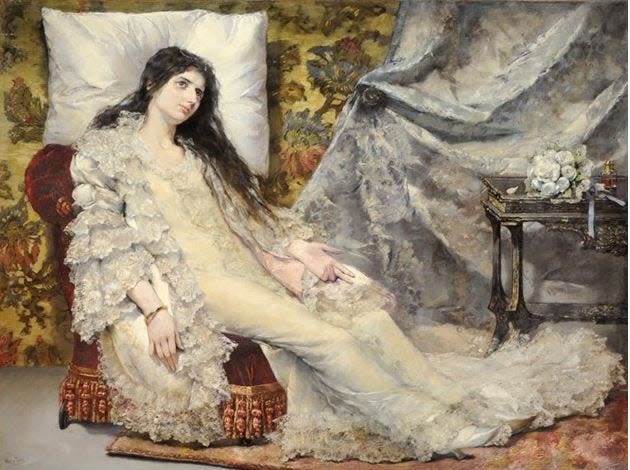Time-honored, ever-popular 'La Traviata' is UI Opera's spring production
- Oops!Something went wrong.Please try again later.

Spring: It’s a time of renewal when the sap rises, flowers bloom, and one’s “fancy lightly turns to thoughts of love.” (Thank you, Alfred, Lord Tennyson.)
Fittingly, the University of Iowa Opera’s spring production is a love story — or more accurately, a story of love, redemption, and loss: Giuseppe Verdi’s "La Traviata." The 170th anniversary of its premiere was March 6, but its appeal remains fresh. In fact, "La Traviata" (literally translated as “The Fallen Woman”) is consistently among the 10 most-performed operas in the world. So what’s the secret to its success?
For starters, it’s a great story, based on the 1848 novel "La Dame aux camélias" by Alexandre Dumas fils. (You may know the classic 1936 movie version of this book: "Camille," starring Greta Garbo and directed by George Cukor.) Set in Dumas' contemporary Paris of the mid-1800s, "Camille" tells of a young man from a respectable family (Armand in the book/ Alfredo in the opera) who falls madly in love with a courtesan, albeit a very high-class one (Marguerite/Violetta). He begs her to forsake the Parisian demi-monde and give herself over to true love. His father has other ideas, which precipitate a crisis in their affair and drive the story to its end.
More:Here are 7 new pieces of art on display at the Stanley Museum of Art you should know about
It is said that Dumas wrote the story from a semi-autobiographical standpoint, alluding to his affair with the famous real-life courtesan, Marie Duplessis. The story may have had special meaning for Verdi, too, as he was then living (scandalously, by the standards of the day) with renowned soprano Giuseppina Strepponi, who is known to have had many lovers before settling down with him. (They married in 1859 and remained together for the rest of their lives.) Perhaps those personal experiences played a part in creating the genuine and intimate quality of both the book and the opera.
Verdi composed "La Traviata" when he was reaching the height of his fame. It is one of his three middle-period operas (along with "Rigoletto" and "Il trovatore") that cemented his reputation as the master of Italian opera. His powerful yet sensitive score contains some of opera’s most beloved melodies, notably the famous "Brindisi," which has been featured in various radio and television advertisements. But it is Violetta’s brace of arias — one in the first act and one in the last — that opera fans likely think of as representative of the opera’s tone and character.
We are privileged to be able to bring this iconic work to the stage with our gifted student singers and orchestra. The pit even includes a cimbasso, a low brass instrument favored by Verdi and other opera composers of his time, though little known in today’s symphony orchestras. On stage, lavish sets and sumptuous costumes in our period production will delight the eye and draw you into the glittering era of 19th-century Paris.
Come join us for the elegance, passion, and pathos of "La Traviata" —April 14 and 15 at 7:30 p.m. and April 16 at 2 p.m., at the Coralville Center for the Performing Arts. Tickets are available through the Hancher box office, hancher.uiowa.edu or 1-800-HANCHER.
Wayne Wyman is the director of opera at the University of Iowa. Wyman’s career has included numerous guest appearances as a conductor and stage director, as well as serving as artistic director of Capital Opera in Raleigh, North Carolina, and Lyric Opera of San Antonio in Texas. He spends his summers in Graz, Austria, on the faculty of the American Institute for Musical Studies and he has presented opera master classes at New York University, the University of Dayton, Rice University and other American universities.
This article originally appeared on Iowa City Press-Citizen: 'La Traviata' is University of Iowa Opera's spring production
